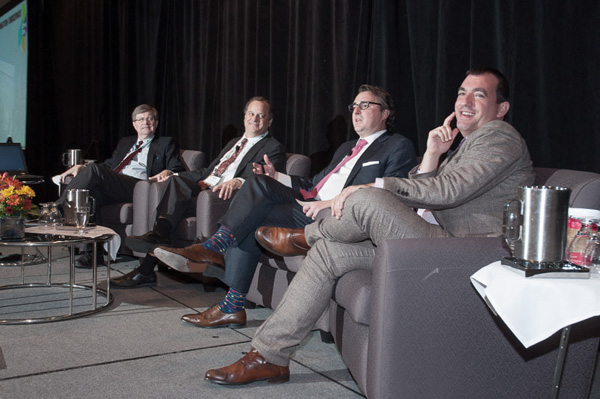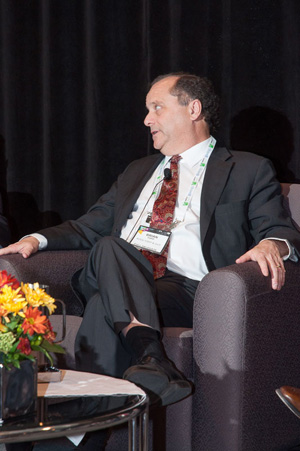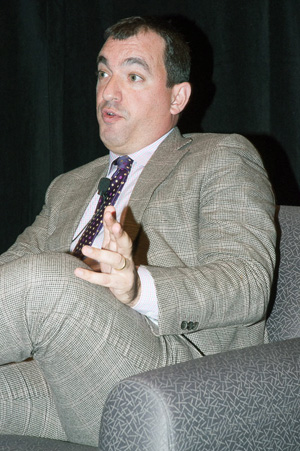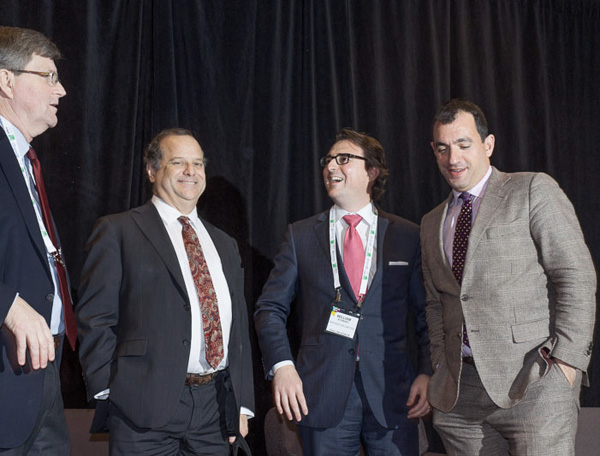Although experts differ on whether climate change itself will play a significant role in the upcoming federal election, there is no doubt that leaders of all parties will be challenged by the scale of costs anticipated for new infrastructure, much of which will be intended to address climate change risks. The costs of infrastructure renewal and replacement are rising sharply in any case, adding weight to the political risks of managing these issues as project commitments are made and communication plans are rolled out.
Management of infrastructure investment is difficult in part because elected officials have highly divergent views on the key messages that public officials need to convey to the public at large. Consistent messaging may prove to be a rare commodity. Strategies for explaining infrastructure financing issues to the public run the gamut from essentially ignoring climate change to solemnly presenting a range of tough choices directly.
To manage the issue properly, “People will take considerable convincing, and politicians will need to find the courage,” said Rob Silver, public policy consultant with Crestview, speaking on the Political Issues Panel at the APPrO 2014 conference.
 Sean Conway, Visiting Fellow at the Ryerson Centre for Urban Energy, chaired a panel of experts November 19, to address the general question “How will the politics of electricity evolve?” Panelists included Brian Topp, formerly the Deputy Chief of Staff to Saskatchewan Premier Roy Romanow, Will Stewart, government affairs specialist from Navigator Limited, and Rob Silver, Crestview Strategy, and an advisor to the Liberal Party of Ontario. Mr. Conway opened the discussing by asking, “What do people involved in the energy sector need to look out for in terms of policy/political issues that are going to get the attention of political class?”
Sean Conway, Visiting Fellow at the Ryerson Centre for Urban Energy, chaired a panel of experts November 19, to address the general question “How will the politics of electricity evolve?” Panelists included Brian Topp, formerly the Deputy Chief of Staff to Saskatchewan Premier Roy Romanow, Will Stewart, government affairs specialist from Navigator Limited, and Rob Silver, Crestview Strategy, and an advisor to the Liberal Party of Ontario. Mr. Conway opened the discussing by asking, “What do people involved in the energy sector need to look out for in terms of policy/political issues that are going to get the attention of political class?”
 Mr. Topp began by touching on the recommendations of a panel headed by former TD Bank Group CEO Ed Clark, the “Premier’s Advisory Council on Government Assets,” which delivered its initial report on November 13. The panel recommended, among other things, selling off parts of Hydro One’s network and using the proceeds to fund transit and transportation improvements. This suggestion will be far more controversial with the public than the government hopes, he said. In addition, he argued that it would lead to higher energy prices and less service, as the purchasers would want to recover maximum profit in return for the premium price the government would expect to receive from the sale. He also questioned the wisdom of trying to solve a long-term deficit with a one-time asset sale.
Mr. Topp began by touching on the recommendations of a panel headed by former TD Bank Group CEO Ed Clark, the “Premier’s Advisory Council on Government Assets,” which delivered its initial report on November 13. The panel recommended, among other things, selling off parts of Hydro One’s network and using the proceeds to fund transit and transportation improvements. This suggestion will be far more controversial with the public than the government hopes, he said. In addition, he argued that it would lead to higher energy prices and less service, as the purchasers would want to recover maximum profit in return for the premium price the government would expect to receive from the sale. He also questioned the wisdom of trying to solve a long-term deficit with a one-time asset sale.
At the same time there is ongoing interest among several provincial governments in east-west cooperation, particularly in terms of large volume electricity exchanges. The topic was broached at one point between the governments of Saskatchewan and Manitoba, but it foundered on the linked issue of privatizing Manitoba’s phone company. Now Ontario and Quebec are discussing the idea, but there are potentially large premiums to be found south of the border for surplus hydro power from Quebec. It appears like a significant opportunity offset by major obstacles.
Mr. Topp put forward the view that serious efforts to address a range of environmental concerns, including climate change, will have to entail fiscal mechanisms like putting an effective price on carbon emissions. Those initiatives will in turn drive fundamental change in the energy sector.
Will Stewart of Navigator posed the hypothesis that “Politics is mostly about expectations.” In that vein, the recently elected Liberal government expects to be able to go on doing what they have been doing for the past several years without needing to change. The people of Ontario have not shown major dissatisfaction with the direction of public policy. This means that the future of the sector will likely be a continuation of the past.
Mr. Stewart observed however that the need for improvement in power infrastructure is a vulnerability the government needs to address. He believes that the electricity sector will not be an issue the upcoming federal election. At the federal level, the issue is pipelines. In that sector, Stewart sees a shift in the calculations of the decision-makers away from concern over social consensus, nebulously construed as it tends to be, to achieving an effective political consensus in favour.
 Mr. Silver said that the fate of the Wynne government four years from now is unpredictable. Ontario will be different in four years’ time. Voter orientation can change with the changing demographics of Ontario’s ridings. With respect to the Clark panel, Mr. Silver expressed doubt about how much of its recommendations will materialize, due to the challenges this and all governments face in completing existing transactions.
Mr. Silver said that the fate of the Wynne government four years from now is unpredictable. Ontario will be different in four years’ time. Voter orientation can change with the changing demographics of Ontario’s ridings. With respect to the Clark panel, Mr. Silver expressed doubt about how much of its recommendations will materialize, due to the challenges this and all governments face in completing existing transactions.
He does not anticipate turmoil in the power sector in the near future. There are two major factors that have created problems for the electricity industry in the past: pre-election jitters – the compulsion to buy votes – and ministers who want to make history. Neither of these factors is active at present. Returning again to the Clark panel, he noted that consolidation of distribution might be the only true cost-saver and efficiency driver in the entire electricity sector. However it still can’t stop the cost of power from rising. As to the panel’s recommendations generally, many of them were too timid. Restructuring is entirely possible. There is no need for the government to own electricity distribution, any more than there is for it to own liquor distribution.
Sean Conway asked the panelists to explain their views on why the gas plant scandal did not result in a change of government. What lesson can be learned from that? Mr. Topp said that the Liberal government was ready to be put in its grave over the issue, if the opposition had combined to defeat it. Instead, the NDP miscalculated by, first, supporting the government to gain concessions in the budget, and then trying to defeat the government over the budget. Meanwhile, there was a new Premier, the public had moved on from the gas plant issue, and initial public support for the NDP trickled away.
Mr. Silver said that elections are not normally referenda on a single issue. Kathleen Wynne is a very different person from Dalton McGuinty. The Liberal team built a platform around her that Mr. McGuinty could not have sold to the voter. Two things muted the gas plant issue for enough of the swing voters: enough people accepted the reasons for the cancellation, and second, cynicism over how all politicians waste our money. And importantly, none of the elected officials benefitted personally.
Will Stewart agreed that the gas plant issue did not affect voter choices, even considering the amount of money wasted over them. The opposition tried to make it an issue of general mismanagement, while voters evidently chose to believe the Liberal platform.
Mr. Conway asked if there is a lesson in the gas plant scandal about how to ensure siting of needed energy infrastructure in a province where growth is becoming uneven.
Mr. Topp joked, at the risk of being glib – don’t try to put a power plant in a Liberal riding just before an election. More seriously, he said, the issue is one of public license. The power plants were opposed by high-income, well-connected and capable individuals because they were afraid about how the power plants might affect the value of their homes. Governments have to learn how to communicate on issues like this that the public generally does not follow.
Will Stewart argued that “All politics is local. People will say they understand the power plants need to go somewhere, but it still comes down to NIMBYism. Developers get signoff from governments and regulators but forget to talk to the grass roots.” This will go on happening, he said, until developers remember to go after the social license.
Rob Silver added that where First Nations are involved it can become even more complex.
Speakers went on to discuss the effect of shale gas on the energy sector in Central Canada over the next 3 to 5 years. Mr. Silver noted that the potential effect of the United States becoming a net energy exporter is massive, geopolitically as well as for climate change. For Ontario, the impact will be significant. When first announced, the coal plant shutdown was seen as a terrible idea for the reliance it would create on natural gas, with its price that could only increase. Now, of course, the conventional wisdom is that natural gas will be inexpensive for the foreseeable future. In practice, the price will probably continue to fluctuate, though probably at a lower level than before.
Brian Topp noted that the vast new supply of natural gas has several effects. It suppresses the market for western Canadian heavy oil, and hence affects the economics of pipelines. It takes pressure off the Canadian dollar. It helps Ontario’s industrial export economy. It also creates a geopolitical strategic challenge for Canada, when the United States sees that it has become less dependent on Canadian energy resources – case in point, the Keystone XL pipeline. He pointed out that Northern British Columbia has been doing deep rock fracking for years without significant environmental issues. Fracking on the water table, as they were debating in New Brunswick, “is madness,” he said. When done badly, it’s led to flames coming out of the water faucet in the US. Public opposition is mounting in several states south of the border. He suggested that the resource needs to be developed in eastern Canada and the industry will learn to deal with the technical issues.
With respect to east-west power trading, Mr. Topp stressed that the recently announced agreement in principle between Ontario and Quebec could absorb all the available transmission capacity between the two, and be an interesting road to go down. There would be two issues: first, the grid has been built north-south, and strengthening east-west linkage will require many millions of dollars. Second, it is not clear whether power producers would be interested. Ontario is looking to contract for six cent to eight cent electricity, that it can sell for thirty cents in the States. Manitoba and Quebec can do the same. The federal government could advance the matter if it chose to, and apparently doesn’t.
Mr. Topp said that political decision makers would be unwise to predicate policy on predictions as to the price of any specific energy sources. Long-term planning is needed to diversify the supply options.
When asked whether government should begin to prepare for renewable energy and storage becoming available at lower costs, even at grid parity, there was general agreement that yes, this would be prudent politically.
A member of the audience asked whether climate change is likely to become an issue in the 2015 federal election, along with the pipelines. Will Stewart said no, for two reasons. The Liberal party is afraid of the issue, after what happened when Stéphane Dion ran on climate change. It also doesn’t match the party’s optimistic theme. Second, this is an issue among the chattering classes in Ottawa, not the general public. It’s only when the two overlap that an issue resonates. Currently the public issues are ethics, foreign affairs, and the economy. Those will be the three core issues for the next federal election.
Rob Silver disagreed. The Liberal party will not hide from the issue, he said. Pipelines and natural resources generally are vital parts of the Canadian economy. Regionally and nationally, no one can talk about energy without talking about climate change. Second, since President Obama is talking about climate change, it is not possible for politicians in Canada to avoid this topic. Climate change will not be the dominant issue in 2015, but the Conservatives have announced targets in the past, and Stephen Harper can’t afford not to have some kind of policy on it.
Brian Topp said that it’s not clear whether the issue is best handled at the federal level. There are huge revenue implications. A serious carbon levy will mean tens of billions of dollars being transferred from Alberta and Saskatchewan to federal coffers. Who owns the resources may become a vexed constitutional issue. As a result, any substantive action might have to take place at the provincial level, as with the carbon tax in BC, and Quebec’s harmonized carbon cap with California.
With respect to the debate over the Energy East pipeline, Will Stewart said that the energy sector is often too complicated and confusing for the average citizen to form a clear opinion on. This problem is heightened by resource developers and environmentalists pulling in opposite directions. Now on this issue you have corporations fighting each other. The ramifications are broader than impeding a decision on a new pipeline. The danger is that most people will look at the experts arguing with each other and tune out of the sector entirely.
In Brian Topp’s view, “Public policy issues are battles over how issues are framed.” He asked, for example, “Do we want to facilitate the export of bitumen to other countries or do we want to secure our own natural gas supply? If this is how it’s framed in Ontario, the bitumen industry will have a hard time making progress.”
Rob Silver said that Enbridge, Union Gas, and TransCanada need to reach an agreement. The three companies all have ongoing projects at multiple locations. Most residential natural gas customers can’t follow the issues, and even tens of millions of dollars spent on their education might barely be enough.
With respect to the public’s willingness to pay a premium for renewable energy, Mr. Topp said that there is always criticism over a major launch of new technology. Renewables will be a part of the picture in future energy supply. The primary challenge will be to bring them on without wasting a lot of money.
Mr. Stewart said that solar power is seen as benign and most people don’t care about the price of renewables, despite the Conservatives’ best efforts. Windfarms still face opposition in getting sited, but the political landscape in Ontario is not particularly affected by that.
Sean Conway asked, considering the conflict over recent infrastructure investments, how can society ensure that the infrastructure we need will be provided?
Brian Topp observed that, “Public goods are not free, and it’s too easy for populist politicians to gloss over the issue of how they get paid for. … We need to convey to the general public the concept that these issues must be addressed clearly and rationally.”
Mr. Silver noted that the scope of infrastructure investments required to adapt to a changing climate are challenging, not least because we can’t even be sure just how quickly threats like more frequent ice storms will materialize – and hence how urgently to spend the money. “People will take considerable convincing, and politicians will need to find the courage.”
 Will Stewart observed that the Ontario electorate has more than once just in recent memory bought electoral promises, and voted governments into power on the basis of those promises, only to learn that the promises were unrealistic. Others who tried to address tough issues honestly lost the election. We will have to do better in terms of facing tough choices publicly, if we want to meet these formidable infrastructure needs, he concluded.
Will Stewart observed that the Ontario electorate has more than once just in recent memory bought electoral promises, and voted governments into power on the basis of those promises, only to learn that the promises were unrealistic. Others who tried to address tough issues honestly lost the election. We will have to do better in terms of facing tough choices publicly, if we want to meet these formidable infrastructure needs, he concluded.
With files from Lavender Zhang and Stephen Kishewitsch.
For further information, please see the following links to articles about past APPrO Political Issues Panels:
The Politics of Power: Blog from APPrO 2016
Be skeptical of silver bullets, political experts agree, report on the 2015 Political Issues Panel
Divergent approaches to infrastructure renewal may define the political debates ahead, report on the 2014 Political Issues Panel
Experts debate Ontario’s readiness for difficult conversations on electricity policy, report on the 2013 Political Issues Panel
Report on the APPrO 2012 Political Issues Panel
